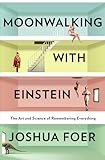Great, fun book — loved it, and read it in a couple of days. Joshua Foer is a journalist (and younger brother of Jonathan Safran Foer, one of my favorite novelists) who was covering the US Memory Championships one year — an annual contest of around 3 dozen “Memory Athletes” who compete to see who can memorize the most digits in five minutes, the order of a deck of cards the quickest, and other contests like that.
While covering the event, he got interested in how memory itself works — can it be learned & trained? — and in the subculture of the memory athletes themselves. So he decided to train for the championship the following year, and to enter it himself.
I love books like this — coverage of deep subcultures of our society that are funny, but without making fun of them. (Candy Freak, by Steve Almond, is one of my favorites.) Here’s what he said about the contest itself: “The demographics of your average memory contest are pretty much indistinguishable from those of a ‘Weird Al’ Yankovic (five of spades) concert. An overwhelming number of contestants are young, white, male juggling aficionados.”
Lots of interesting stuff in this one, including going through some of the systems for memorizing long strings of items. The millennia old Memory Palace technique, the newer (just a few hundred years old) Major Method, or the even newer PAO system (that the title of the book alludes to). A fair amount of coverage (but not all that deep) on how our memories work, what happens when parts of our brains are damaged, etc.
One of the funniest realizations in the book: “Not long after returning from England, I found myself sitting on a folding chair in the basement of my parents’ home at 6:45 a.m., wearing underpants, earmuffs, and memory goggles, with a printout of eight hundred random digits in my lap and an image in my mind’s eye of a lingerie-clad garden gnome (52632) suspended over my grandmother’s kitchen table. I suddenly looked up, wondering—remarkably, for the first time—what in the world I was doing with myself.”
He also included a chapter on his conversations with Gordon Bell, early at DEC and of late trying to record and externalize all his experiences and memories, so he can recall everything that’s happened to him with a few keystrokes. There are threads in the book that talk about how we read today compared to how we used to read (internalized versus externalized), and what memories are for at all. Some profundities for sure, like this one:
“So why bother investing in one’s memory in an age of externalized memories? The best answer I can give is the one that I received unwittingly from EP, whose memory had been so completely lost that he could not place himself in time or space, or relative to other people. That is: How we perceive the world and how we act in it are products of how and what we remember. We’re all just a bundle of habits shaped by our memories. And to the extent that we control our lives, we do so by gradually altering those habits, which is to say the networks of our memory. No lasting joke, invention, insight, or work of art was ever produced by an external memory. Not yet, at least. Our ability to find humor in the world, to make connections between previously unconnected notions, to create new ideas, to share in a common culture: All these essentially human acts depend on memory. Now more than ever, as the role of memory in our culture erodes at a faster pace than ever before, we need to cultivate our ability to remember. Our memories make us who we are. They are the seat of our values and source of our character. Competing to see who can memorize more pages of poetry might seem beside the point, but it’s about taking a stand against forgetfulness, and embracing primal capacities from which too many of us have become estranged. That’s what Ed had been trying to impart to me from the beginning: that memory training is not just for the sake of performing party tricks; it’s about nurturing something profoundly and essentially human.”
But mostly just a fun journey through a subculture that most of us haven’t ever experienced. Very quick to read; both fun and worthwhile.


I saw the NYT excerpt a couple weeks back. The memory-palace concept goes a long way toward explaining how I can remember very specific details of days from the long-distance backpacking trips I’ve done, even years after the fact, despite their being in large extent just a bunch of days of walking.
You might also consider Word Freak as another worthwhile entry in the “coverage of deep subcultures of our society that are funny, but without making fun of them” genre.